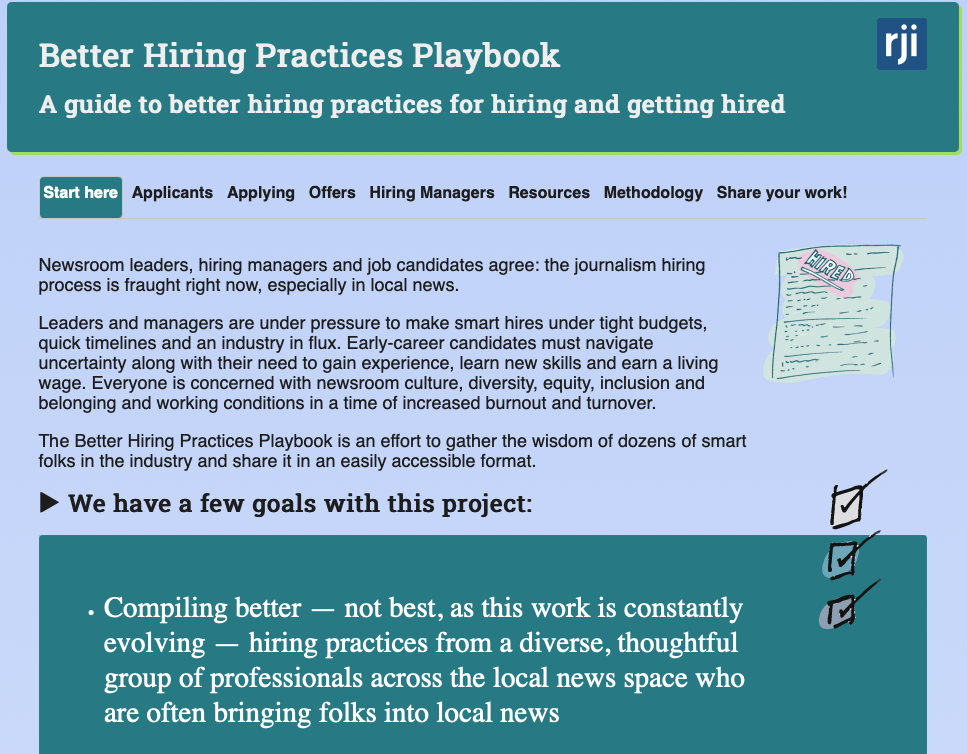Applying for jobs in journalism can feel like an isolating, demoralizing experience. Lack of salary info, unclear timelines, lengthy application materials and ghosting can all zap candidates’ optimism about this industry.
Hiring for new positions can also be challenging, especially for small news outlets and overworked managers juggling the day-to-day news cycle with operations and strategic initiatives while trying to fill open positions.
Coming to the rescue is the “Better Hiring Practices Playbook,” a resource for both applicants and hiring managers created by a team at UNC’s Center for Innovation and Sustainability in Local Media (CISLM) and the Reynolds Journalism Institute.
For applicants, there’s an early career checklist, TikToks on journaling prompts for job searches and asking about company culture, as well as a lot of reassuring wisdom from experts and advice from other early career journalists.
For managers, the Playbook includes a hiring checklist, recommendations for better recruitment & interviews, ways to evaluate your company’s culture to improve retention & this terrific “Welcome” template for new employees.

Sarah Vassello, the Playbook’s author and project manager for CISLM, wrote they wanted to create an accessible, public set of standards that “focused on more transparent, equitable, and intentional hiring practices and processes.”
This is a topic I’m passionate about because it directly connects to many of the things we’re trying to improve in journalism, from culture and DEIB to retention, advancement and sustainability. And full disclosure, I was one of 25 people interviewed for the playbook after piloting new hiring practices and co-presenting with Amy Kovac-Ashley at this year’s NC Local News Summit (access Amy’s exceptional Leadership Succession Guide here).
Before we get into our Q&A with Vassello about the Playbook, a round of applause for the team of 2022-2023 undergrads who also worked on the project, including Katelyn Chedraoui, Adejuwon Ojebuoboh, Lucas Thomae, Daniel Wei and Caitlyn Yaede.
CK: First, let’s get some terminology out of the way. I notice you specifically call out the term “best practices.” It’s such a common phrase across industries. Why does it fall short?
SV: The term better hiring practices came out of an interview we did with one of our participants. We wanted to highlight that this playbook wouldn’t be an end-all, be-all source of information and that this work is constantly evolving. She suggested “better” instead of “best” to underscore that point, which I loved.
What sparked the idea for this playbook? Did CISLM’s research on burnout in local news from earlier this year or the 2022 NC diversity audit surface better hiring as part of the solution?
Within our team at CISLM, we have a lot of conversations about the different career paths of a journalist — what opportunities are there, what pain points do folks face at each level, where and when and why might someone might leave journalism, etc. We believe a stable and productive journalism workforce is key to local news sustainability. For too long, the needs of journalists haven’t been considered in the sustainability debate.
We were having a similar conversation with the folks at Reynolds Journalism Institute, and closer to home, I was answering questions and giving advice about internships and first jobs for my interns.
The burnout report and the diversity audit highlighted areas where folks are getting less respect than they deserve, and the reports helped ground our findings in other research, which was really wonderful.
The playbook is geared toward early career journalists, why did you want to focus on this demographic?
We know that there are problems at all levels of hiring and, especially, retention in local news career pathways. But because we’re based at UNC and we work frequently with undergraduate interns and students across the board, this work is more personal for me at the early-career level. I wanted my interns to be able to talk to folks about how they could advocate for themselves, and I wanted to be able to share that guidance with anyone else in their shoes who might want or need it.
I also want to show early-career journalists that local news could be an option, even if it might not be the highest-paying job you apply for — if the organization’s mission aligns with yours and your financial needs can be met. Meeting your needs is essential — that’s why we have jobs — but if that’s settled, there’s a lot more to consider than money that can help align your job to your personal goals.
I think there’s certainly room, and need, for more resources for journalists or potential journalists down the line of seniority/time in journalism.
Some of the resources seem to be grounded in disrupting power dynamics a bit, including sections for applicants exploring “Is this where you want to be?” and “Knowing your worth.” What were you and the undergraduate interns who created this playbook hearing that underscored the need for these resources?
I think there’s this pressure that’s so commonly felt at the early career level — you’ve worked so hard just to get to the position to apply for a job, whether that’s through college or through hands-on education. And I’ve seen folks take jobs that don’t align with their goals because it was a big name, the “best brand.” I think in some cases it helps journalists feel that the sacrifices were worth it, which is so valid, but I think that mindset also helps contribute to burnout and disillusionment a few years out.
When I was graduating college, I felt very fortunate that I had a student media advisor who helped me navigate the genuine stress and fear I had about entering journalism, which has a reputation for making its workers feel dehumanized. My advisor told me that I didn’t have to get trapped in a job that didn’t align with my values or fit the life I wanted; that I had the power to be a journalist about my career path and ask hard questions before committing. And now my former college media advisor is my boss, so I had a great opportunity to pay it forward, so to speak. 🙂
Like in any industry, there are “good jobs” and “bad jobs” — I think it’s powerful for anyone applying to any job to hear that you have agency, you are in control of yourself and job interviews are a mutual conversation.
The playbook has lots of resources for leadership and hiring managers too. What should they be thinking about before posting an open position?
One of the respondents said that hiring shouldn’t be done in your free time — I think that hits the nail on the head. Being very intentional, being extremely clear on the hiring timeline, being easily reachable for any questions/concerns, really taking the time to think about the responsibilities of the role and examine if it’s overwhelming for any one person — those stand out to me. And, of course, I think every job listing these days should include a salary range if possible.
It can take a lot of time and resources to change hiring practices, especially for smaller organizations that might not have HR staff. Where do you recommend organizations begin to start seeing improvements in their practices?
I think the easiest place to start is creating an auto-response for every applicant submission that outlines the hiring timeline and an easy way to get in touch with the hiring manager/team. We created a Google Doc template in the guide so folks could make a copy, but being clear about expectations and respecting the time of applicants feels like a good step. We just recently implemented it for our internship application process.
We also have a list of consultants in the guide who quite literally are pioneering this work and are available for hire. They’d be happy to help get any organization started.
Did anything surprise you about the research? Any practices or resources you and the team got excited about or see as being really effective?
The thing that maybe wasn’t surprising but touched me the most is that there are so many people who care and want things to be better. There’s certainly a shared commitment to improvement, which is always amazing to see.
In terms of resources, I really loved LION’s templates that they shared to help facilitate a people-focused culture.
What’s next for this research and the playbook? Are you continuing to solicit input?
We’re not currently doing more interviews, but if you’re interested in sharing your work, have feedback or want to let us know how you’re utilizing this guide, please let us know at cislm@unc.edu or will.lager@rjionline.org.



